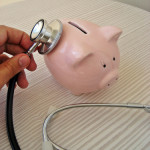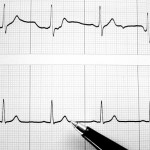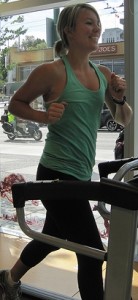by Michelle Sutton-Kerchner
Aside from Valentine hearts, chocolates, and flowers, February reminds us to investigate that muscle responsible for life. It’s Heart Health month. How healthy is yours …
In the name of love– for self and others– be attentive to your heart’s well-being. Perhaps that extra rapid beat isn’t the result of a doe-eyed sweetheart. Don’t shrug off palpitations as an outcome of stress. Recognize indicators of heart disease and know your risk factors. One of every four deaths in the United States results from heart disease. And that’s a long stretch from being love struck.
 Cardiovascular disease, which includes heart disease and stroke, is preventable and controllable. Along with being among the nation’s top killers, it is estimated at costing the country $312.6 billion every year. The economy suffers, regardless of who sits in Office; wages are lost, as a leading cause of disability; business and productivity lag. By far though, the cost of life is the biggest expense, both in diminished quality and untimely ending.
Cardiovascular disease, which includes heart disease and stroke, is preventable and controllable. Along with being among the nation’s top killers, it is estimated at costing the country $312.6 billion every year. The economy suffers, regardless of who sits in Office; wages are lost, as a leading cause of disability; business and productivity lag. By far though, the cost of life is the biggest expense, both in diminished quality and untimely ending.
Statistics are alarming, yet motivating in a world where we drive-thru, dial-up, and log-in. Journey your way to a happy heart, despite genetics and health history. Here’s how:
Know Your Heart

Before initiating cardiovascular health improvements, get your personal facts. Even a healthy heart benefits from an exam to gain a baseline study. A health history on file is a lifelong asset. Know what is typical for you, your heart, blood counts, and general well-being. In times of illness, an EKG or blood work from healthier days is an asset for comparison. Maybe your heart always beat to the tune of a different drum.
Discuss findings with your physician and determine any necessary modifications to your current lifestyle, including diet and exercise.
Get Formal Exercise
Beyond physical activity, the cardiovascular system becomes healthier with a definitive cardio workout. As with any other muscle, the heart can be strengthened through fitness. A cardio workout should reach maximum heart rate, without excessive strain. A personal trainer can help you determine this point in your workout and how long you can safely remain there.
Physical fitness helps lower high blood pressure, cholesterol, and other dangerous blood levels. Combined with its added perk of maintaining a healthy weight, exercise is an essential element for heart health. Adults should participate in thirty minutes of exercise most days of the week, as recommended by the Surgeon General.
Be Active
Fitness programs are only part of a healthy lifestyle. Consider how you spend time outside the Center. Are you generally active? Do you sit for long periods of time without stretching or extensive movement?
 Future guidelines distributed by the U.S. Department of Health and Human Services on exercise are expected to include limitations on sedentary time (particularly sitting). Consider these frightening statistics, which directly connect sitting to heart disease. Get out of that La-Z-Boy:
Future guidelines distributed by the U.S. Department of Health and Human Services on exercise are expected to include limitations on sedentary time (particularly sitting). Consider these frightening statistics, which directly connect sitting to heart disease. Get out of that La-Z-Boy:
- Every hour spent watching TV (an activity that usually involves sitting) was associated with an 18 percent increase in heart disease deaths and an 11 percent increase in deaths overall. *
- People who watched TV at least 4 hours a day were 80 percent more likely to die of heart disease than those who watched less than 2 hours a day. *
- A Canadian study of 17,000 adults also confirmed a link between chair time and deaths from heart disease. The more people sat at length, for any reason, the more likely they were to die from heart disease within 12 years. (If you knew you only had 12 years left, would you spend them sitting around?)
- The average American supposedly watches approximately 5 hours of TV daily. Do you? Track your hours in front of the screen—TV or otherwise. More numbers to know, and reduce, for your health!
*According to a study of 8,800 Australians followed for six years, as per an online report in Circulation, the Journal of the American Heart Association.
New findings report body weight is not as critical in overall health as fitness level. Although not an excuse to flab-up, it does emphasize the importance of movement and exercise in our lives. Know your weight on the scale and your body mass index. Determine how much fat you are carrying versus muscle, which may be a more accurate weight indicator than a pair of skinny jeans.
Consistent exercise definitely improves health. However, you can be an avid exerciser and still, unintentionally, increase your risk for heart disease, obesity, and other health concerns. Be cognizant of how you spend non-exercise time. Include frequent movement in your days. Fitness goes beyond what you accomplish at the Center. Make health a lifestyle.
Eat Well
Many theories circulate about foods to improve heart health. Some are credited with lowering blood pressure, others with cholesterol and triglycerides. The list is ongoing and changing with the sea of information discovered daily.
 Eat an abundance of fresh fruits and vegetables. Fill up on them! Toss some omega-3 fatty acids in the form of seafood on your plate. Minimize intake of red meat, sodium, and sugar. Focus on fiber. These rules seldom change. Whether best paired with the latest discovery of ancient legumes from long-lost worlds, tomorrow can only tell.
Eat an abundance of fresh fruits and vegetables. Fill up on them! Toss some omega-3 fatty acids in the form of seafood on your plate. Minimize intake of red meat, sodium, and sugar. Focus on fiber. These rules seldom change. Whether best paired with the latest discovery of ancient legumes from long-lost worlds, tomorrow can only tell.
Don’t be overwhelmed by healthy eating. For now, stick with the basics in nutrition and add on as you feel adventurous. At least you will be sure to follow the USDA’s basic recommendations. Anything additional are multigrain sprinkles atop the dark, leafy greens of life. The abundance of nutrition information bombarding us is an obesity epidemic itself.
Do What You’re Told
No one needs to be reminded of the Don’ts: Don’t smoke. Don’t drink to excess. Don’t forget your medicine. You know the reasons. They are plentiful, and extend beyond heart health alone. Do what is needed to manage life free of addictions– from cigarettes to stress. It is not easy. If your goal is optimum health, it is necessary.
Take your medication, Mr. Tough Guy. It’s not a sign of weakness to require a prescription. Rather, it is sometimes necessary to maintain health. Once blood pressure, cholesterol, or other health conditions are controlled, an improved lifestyle of good nutrition and exercise may allow a decrease or elimination of maintenance medicine.
Know the Signs
Do not be caught by surprise. When experiencing a cardiac event, a timely reaction can be lifesaving. Call 911 if you or someone you know experiences signs of a heart attack. As per the Centers for Disease Control and Prevention, the five major symptoms of a heart attack are:
- Pain or discomfort in the jaw, neck, upper stomach, or back;
- Feeling weak, nauseous, light-headed, or faint;
- Chest pain or discomfort;
- Pain or discomfort in arms or shoulder;
- Cold sweats;
- Shortness of breath.
Heart attacks do not always present in the chest-gripping, crumble-to-the-floor scenarios shown on drama TV. Often, atypical symptoms present, leading to confusion and delayed response. Contrary to popular belief, atypical signs of heart attack can occur in both genders. A study presented at the Second International Conference on Women, Heart Disease, and Stroke revealed gender-related statistics of the following symptoms:
Pain, shortness of breath, fatigue: No gender differences
Right-side chest discomfort: 4.7 times more likely to be reported by men
Throat discomfort: 12 times more likely to be reported by women
Discomfort: 2.7 times more likely to be reported by men
Dull ache: 3.9 times more likely to be reported by men
Pressing on the chest: 7.3 times more likely to be reported by women
Vomiting: 3.9 times more likely to be reported by women
Indigestion: 3.7 times more likely to be reported by men
Atypical symptoms can occur in both genders, as shown. This results in delayed reactions. In the study, men typically waited three hours to phone for help and women waited an average of four. More women than men die of cardiovascular disease each year. Know all the signs and heed their warning.
Build a healthy heart. It’s one of the greatest loves.
Sources
“Men vs. Women: Confusion Over Heart Symptoms,” by Miranda Hitti at www.webmd.com.
“Your Health: Too Much Sitting Puts the Body on Idle,” by Kim Painter at www.usatoday.com.
www.womenheart.org, Facts and Figures.
Image Credits
Red glass rocks: http://www.flickr.com/photos/hammer51012/2756037659/
Health costs: http://www.flickr.com/photos/68751915@N05/6793821977/
Heart beat: http://www.flickr.com/photos/rvoegtli/5343361247/
Heart healthy workout: http://www.flickr.com/photos/lululemonathletica/4911292680/
 Fitness & Wellness News Your Source for Fitness News, Wellness News, Health News, and Nutrition News!
Fitness & Wellness News Your Source for Fitness News, Wellness News, Health News, and Nutrition News!




